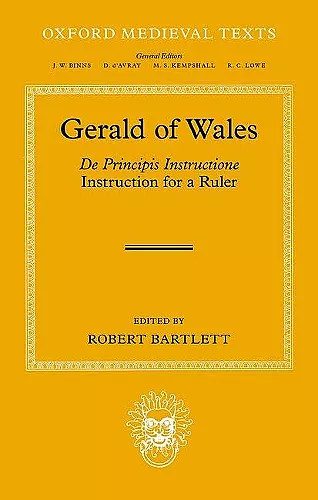Gerald of Wales
De Principis Instructione
Format:Hardback
Publisher:Oxford University Press
Published:7th Jun '18
Currently unavailable, and unfortunately no date known when it will be back

Gerald of Wales was an ecclesiastic, a servant and critic of the Angevin kings, and a prolific and vitriolic writer. Born in Pembrokeshire of mixed Norman and Welsh blood in the middle years of the twelfth century, he was appointed archdeacon of Brecon in 1175, but that was the highest office he attained, despite his indefatigable efforts in the years 1198-1203 to become not merely bishop, but archbishop, of St Davids. His death was reported in 1223. His Instruction for a Ruler (De principis instructione) is of interest for three main reasons: it provides a detailed and violently partisan account of the last days of Henry II of England; it is full of miscellaneous but valuable stories and anecdotes (such as the account of the discovery of the tomb of Arthur and Guinevere, and the legend of the destruction of the Picts); and it is a monument to the literary culture of a highly educated writer at the heart of the twelfth-century Renaissance.
[A] pleasing addition to the wonderful Oxford Medieval Text series. * Katherine Harvey, Times Literary Supplement *
It is a testament to Gerald's skill as a writer, and to the strength of his personality, that he manages to maintain a lively authorial voice amidst such a dense collection of quotations. Bartlett provides useful apparatus for the reader to navigate this characteristically discursive style ... With this new focus on Gerald as an author and serious consideration given to his sources and interests, Bartlett opens up questions of Gerald's composition habits and lays the groundwork for future studies of his style, sources, and interests -- including, for example, his habit of quoting himself. With this exceptional edition in hand, future scholars interested in Gerald as author are already halfway there. * Georgia Henley, Speculum *
Bartlett makes accessible an important work by Gerald, in a new improved edition, with detailed commentary, and full translation. This thereby makes possible a very comfortable access to one of the most enigmatic British authors of the late 12th century ... for experts as well as beginners there is a detailed commentary, a bibliography, and an Index of sources and a General Index. * Sita Steckel, Historische Zeitschrift [translated] *
Robert Bartlett's massive labour of love and research into this comprehensive and definitive edition... Few would contest the fact that Bartlett is the historian for the job, having spent a life-time in Gerald's literary presence, and being the first major biographer of Gerald with his Gerald of Wales: A Voice of the Middle Ages in 1982 (revised in 2006). The result is an invaluable and hugely impressive work of deep and enduring scholarship. * Sean McGlynn, Plymouth University at Strode College, Royal Studies Journal *
This volume provides us with the first edition and translation of the complete work, informed by the editor's considerable knowledge of Gerald's life and works, and executed according to the high editorial standards one expects from the Oxford Medieval Texts series. We are now able to appreciate for the first time the idiosyncratic qualities of Gerald's 'mirror for princes' and the sources upon which he drew, while reading as never before Gerald's powerful and personally charged account of the downfall of King Henry II. * Michael Staunton, University College Dublin, Early Medieval Europe *
Bartlett's full edition is based on the single fourteenth-century manuscript with a complete version of De principis instructione, representing Gerald's second, revised edition: British Library, Cotton MS Julius B XIII, folios 48–173. Gerald described his monumental scholarly endeavours as 'restoring myself to myself'; appropriately, Bartlett devotes a section of his introduction to 'Gerald's use of himself', which traces material that Gerald copied or adapted from his other works, which include letters, hagiography, an account of the late twelfth-century conquest of Ireland, and works on the land and legends of Ireland and Wales. * Emily A. Winkler, Medium Aevum *
The Introduction, Text and Translation are flawless and therefore exemplary, accompanied by an extensive commentary and succinct informative notes on the Latin text, a register of sources and the secondary literature; and various Indices conclude this magnificent volume. One can say without exaggeration of Bartlett's new edition that this late work of Gerald can now for the first time be appropriately read and understood ... As so often in the history of the Latin middle ages, once more the slender transmission of the text implies nothing about its literary merit and its importance as a historical source ... It is to be hoped that Medieval Studies can learn what various possibilities for further research are offered by Bartlett's excellent new edition. * Rolf Köhn, Francia Recensio [translated] *
Bartlett's translation is competent and accurate ... His introduction is lucid, concise, and thorough. This book is a scholarly achievement, the culmination of decades of work on Gerald and on medieval British history more broadly. It would suit the shelf of anyone interested in Gerald, medieval Britain, twelfth-century court culture, or the Angevins. * Keagan Brewer, Parergon *
With this exceptional edition in hand, future scholars interested in Gerald as author are already halfway there. * Georgia Henley, Saint Anselm College, Speculum *
ISBN: 9780198738626
Dimensions: 223mm x 147mm x 54mm
Weight: 1202g
872 pages